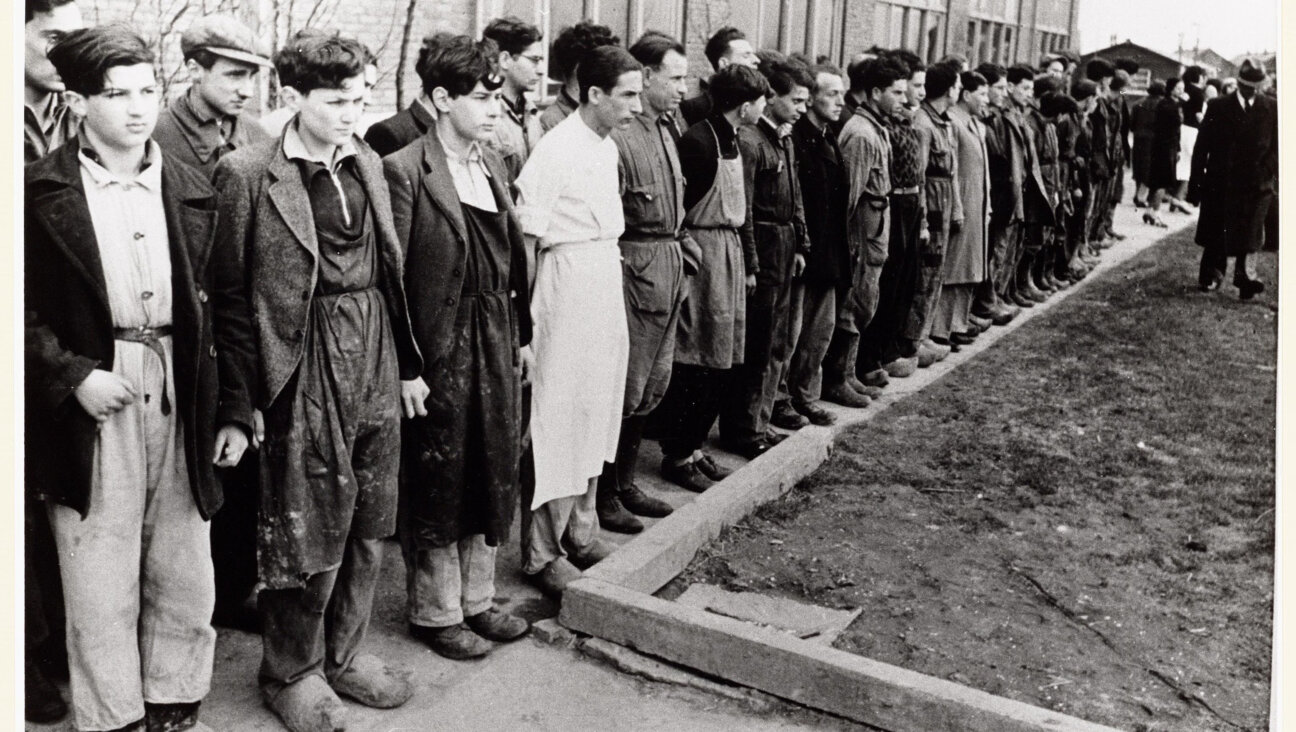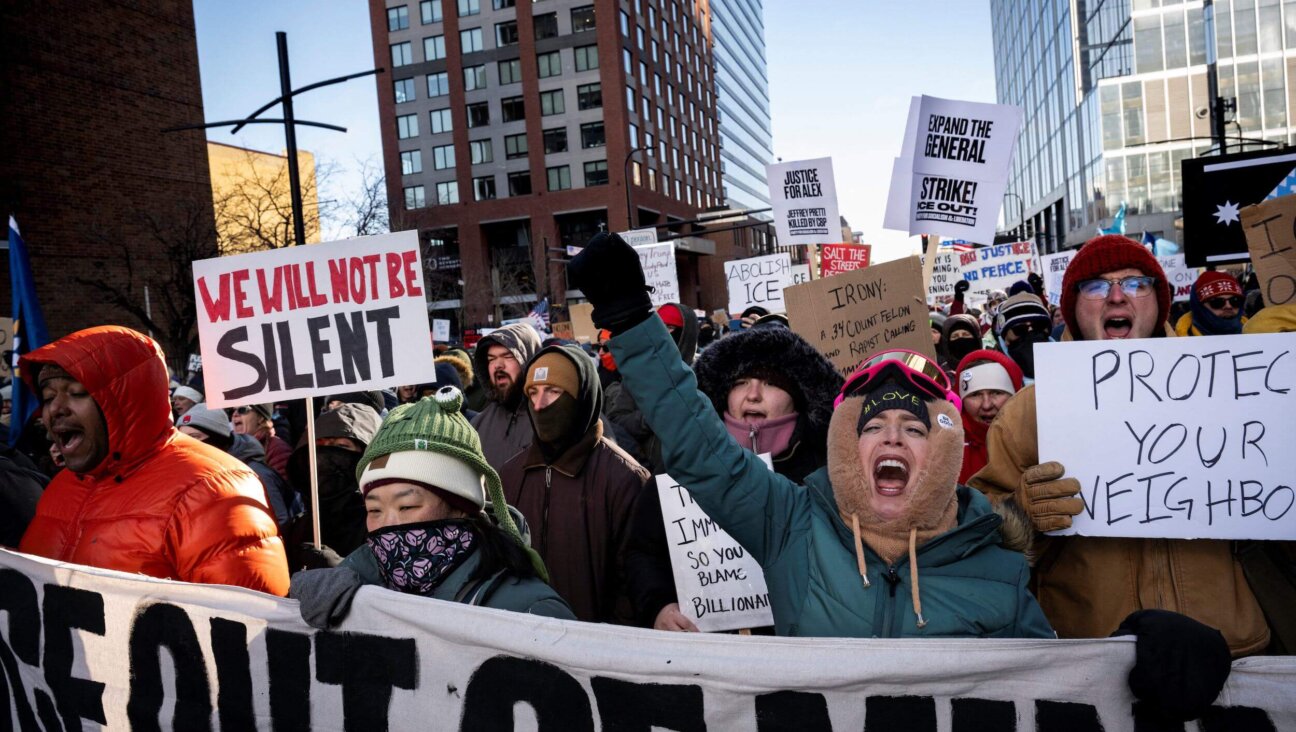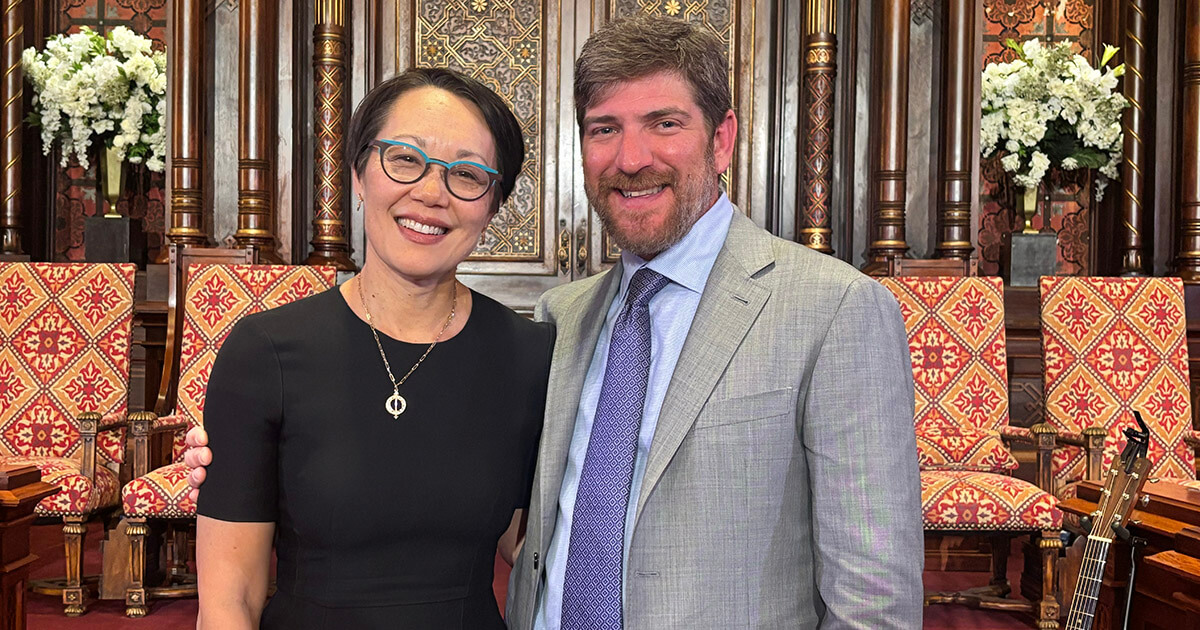Why Jewish Anxiety Is No Laughing Matter

Image by Michael Berson/Kurt Hoffman
I’ve been biting my nails ever since I’ve had a full set of baby teeth. Sometimes I twirl my hair, tap my foot or overanalyze everyday situations. For me, Woody Allen’s neurotic existential musings or Larry David’s socially awkward malaise come as assurance I’m in good company. They validate anxiety as a fact of life. As vexed as they are Jewish, they make anxiety seem not like an individual issue, but one shared amongst the tribe.
My so-called anxiety has always been just shpilkes, or needles — in the sense of restlessness. I have never been diagnosed with an anxiety disorder. It was probably just a matter of growing up in a family that had accumulated a substantial collection of therapists over the years. My shpilkes were nurture and not nature, or genetics. Or so I thought. Until I began to wonder: Is there a reason the stereotype of Jewish anxiety is so popular, and not just among comedians? Is Jewish anxiety real?
Yes, there is Jewish humor that jokes about anxiety, but not necessarily a legitimate, group-specific form of anxiety disorder classified as Jewish, said Dr. Rachel Klein, professor of psychiatry at the NYU School of Medicine.
Generalized anxiety and associated stress disorders — panic disorder, obsessive-compulsive disorder, social anxiety, specific phobias and posttraumatic stress disorder — are the most common form of mental illness in the United States. According to the National Institute of Mental Health, about 18% of Americans age 11 and older experience some kind of anxiety disorder. For 22.8% of these cases — that’s 4% of the adult population — the condition is classified as “severe.” Though doctors agree anxiety disorders are among the most treatable disorders in psychology, nearly 60% of those suffering from any one kind of anxiety disorder go untreated. Despite the humor that may surround it, anxiety can be a serious condition that afflicts a large proportion of the population, both Jewish and not.
The combination of genetic predisposition and what happens in one’s life can determine whether one develops an anxiety disorder, Dr. Barbara Rothbaum, director of the Trauma and Anxiety Recovery Program at Emory University School of Medicine, told me. However, new research into epigenetics — the study of how genes are expressed — indicates that anxiety and other stress-related disorders may be influenced by our parents’ and grandparents’ experiences more than we may have thought. In that case, if anxiety is shared among Jewish parents and their offspring, does that make the anxiety itself Jewish?
In a study this past year, Dr. Kerry Ressler, professor of psychiatry and behavioral sciences at Emory School of Medicine, found that fear can be inherited. By training mice to be afraid of an odor, Ressler and lab partner Dr. Brian Dias found structural changes in the nose and part of the brain that represents olfactory learning. Those animals had enhanced sensitivity, especially to “environmentally salient cues,” said Ressler. Then Ressler and Dias mated these mice (mostly male) and removed them from the mother, making sure that they never had contact with their offspring. Still, the next generation also had a heightened sensitivity to the odors that caused fear in the father. “That effect in the nose and the brain was mediated by epigenetic changes in the father’s sperm,” said Ressler.
In his studies of inner-city, impoverished children and parents, Ressler found higher rates of stress-related disorders, depression and posttraumatic stress disorder. There’s an “intergenerational risk,” whereby offspring of traumatized parents appear to be at a higher risk themselves. Anxious parents may take a different approach to childrearing. Or it might be that, through observation, children adopt the same fearful view of the world that their anxious parents hold. Furthermore, there may be genetic or epigenetic processes which also contribute to the next-generation risk.
“Exposure to an environmental situation, toxin or stress can alter how genetic signals are read out in the next generation,” said Ressler. Higher rates of anxiety may not be particular to any one ethnicity, he told me, but to any group that has experienced multiple generations of persecution, hardship, or war — which would make Jews top candidates.
That’s exactly what Dr. Rachel Yehuda, director of the Traumatic Stress Studies Division at the Mount Sinai School of Medicine, found: Her research shows that those raised by Holocaust survivors are more likely to exhibit signs of posttraumatic stress disorder which, until a recent update to the DSM-5, was classified as an anxiety disorder. Many children of survivors grew up with parents who displayed signs of trauma disorder: irritability, mood swings, hyper-vigilance and lack of rootedness. In these cases, nature and nurture both play a significant role in children’s psychology. Through her research into epigenetics, Yehuda found that survivors’ children inherited genes whose expression is influenced by their parents’ experiences. The genetics themselves don’t necessarily change, but the gene function does.
The experiences of Holocaust survivors or other Jews who experienced persecution may have influenced present epigenetics within the Jewish gene pool. But “Jewish anxiety” has yet to catch on in the medical community. Still, said Ressler, epigenetic research can lead to new kinds of treatment that target biological markers with different kinds of drugs.
Though it isn’t recognized as a legitimate psychological ailment, “Jewish anxiety” is well ingrained in Jewish culture. Woody Allen and Larry David weren’t the first ones: The book of Genesis defines the people of Israel as “those who wrestle constantly with G-d and with people.” This incessant struggle throughout history could be an environmental source of anxiety. In his book “The Vanishing American Jew,” Alan Dershowitz presents his “Tsuris Theory of Jewish Survival.” He writes that Jewish identity, in part, is a function of tsuris — Yiddish for worries, troubles, aggravation or suffering. In contemporary times, as Jews experience fewer threats to their peoplehood, Dershowitz argues that tsuris becomes less a cultural motif that bonds and defines the tribe.
So is joking about anxiety a way to cope with our history? Psychiatrist Klein warned me that the stereotype of Jewish anxiety may pose some risks. By stereotyping anxiety as “part of life, something we should endure,” she said, those who merit a diagnosis may not actively seek out psychological treatment. “We feel we should be tough, or pull ourselves together.” But it’s important to distinguish anxiety from worry — a distinction that can be hazy: “You draw the line when it impairs your function and well-being,” Klein explained. “If it’s uncomfortable but doesn’t affect how your life goes, it’s not clinically a significant condition.”
I’ve been lucky that my own brand of “Jewish anxiety” hasn’t impaired my well-being. My family was also lucky enough to escape Europe before the Holocaust and even before World War I. But before their emigration, my great-grandparents lived in fear of the Russian pogroms and widespread anti-Semitism. So whether I can attribute my shpilkes to theirs is debatable, but epigenetic research could bring me one step closer to finding out. In the meantime, I’ll try to groom my nails with a clipper instead of with my teeth.
Madison Margolin is a Forward Summer Fellow. Contact her at [email protected]














